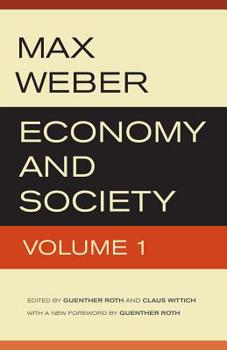Economy and Society
Select Format
Select Condition 
Book Overview
The definitive new translation of Max Weber's classic work of social theory--arguably the most important book by the foremost social theorist of the twentieth century. Max Weber's Economy and Society... This description may be from another edition of this product.
Format:Paperback
Language:English
ISBN:0520280024
ISBN13:9780520280021
Release Date:October 2013
Publisher:University of California Press
Length:1712 Pages
Weight:2.95 lbs.
Dimensions:4.8" x 6.5" x 9.8"
Customer Reviews
4 ratings
A Classic
Published by Thriftbooks.com User , 19 years ago
This is an uncommly brilliant work in social theory and sociology. Moreover, economic sociology was founded through "Economy and Society", especially its second chapter ("Sociological Categories of Economic Action") which is the size of a small book (approx. 200 pages). The general theoretical approach of Weber can be characterized as one of "interpretive economic sociology", that is, as a type of economic sociology in which the concept of "meaning" is at the very center of the explanatory exercise. Social action (to follow Ch. 1) is defined as a type of behavior to which meaning is attached ("action"), and which is oriented to the behavior of others ("social"). Economic sociology consequently deals with "economic social action". "Economy and Society" was part of a larger work entitled "Handbook of Social Economics", which included volumess on "Economy and Nature", "Economy and Technology" - and "Economy and Society". In his work Weber explores such topics as "economy and law", "economy and religion", "economy and politics", and much more. The work "Economy and Society", finally, is a bric-a-brac. Weber himself only sent 4 chs to the printer (=Chs 1-4). The rest of the 2 volumes consists of manuscripts that his wife and economist Melchior Palyi put together, pretty much as they saw fit. Caution is consequently necessary when reading "Economy and Society"; and this work should not be treated as "a book" by Weber.
ES and Schluchter's developmental history
Published by Thriftbooks.com User , 20 years ago
It seems that many people comment this book with the difficulty to read and the bad organization. However, I want to suggest that after read Schluchter's 'The Rise of Western Rationalism', you will know more about why Weber's writings are in this style. Simply speaking, it links to Weber's view of History, and if he want to elaborate the history in a approiate way, not a simple linear evolutionary way, he had to demonstrate the whole picture--or in Schluchter's word, 'basic configuration'--of history. History, in this case the rise of Rationalism, is not compose solely by few influential events, but also related to the others. Those 'significant historical events' are only the consequence of the competition between ideas and historical events, therefore, Weber wanted to explain why the configuration favour the rise of western rationalism, so he must concern all elements constitute the history. That is, Weber showed us the conditions and the process of competition within or among the many spheres, I think that is why Weber had to use this seems fragmented writing style.
Economy and Society
Published by Thriftbooks.com User , 24 years ago
What can I say of this work that has not already been said. This is the core of Structural Functionalism. It is presented as an argument against Karl Marx's Capital and his 1844 Manuscripts. Weber argues that the economic sphere is not the only factor in determining social structure. While Marx divides society into owners and workers, Weber presents society as composed of several layers of classes and status groups.
One of the Top Ten social science books of all time!
Published by Thriftbooks.com User , 24 years ago
Weber's Economy and Society was the number one pick by sociologists at the World Congress of Sociology. Twenty percent chose the book as one of the top ten. No other book had as high a percentage of admirers. Many key concepts come from this encyclopedic work: Modern Capitalism, modern bureaucracy, charismatic authority, and goal-rational social action. The overall thesis of this complex magnum opus concerns the de-mystification and rationalization of our world, the famous iron cage thesis. One neglected aspect is Weber's ideal type model of patrimonial prebendal traditional authority and its oscillation with feudal authority. Feudalism promoted capitalism and capitalism has a tendency to become an iron cage of instrumental rationality. The main difficulty with the book is the casuistic writing style; it is not a book to sit down and read, but more like a reference work. Before accepting trendy PoMo discourses take a good look at this in depth examination of one key aspect of globalization. (This two volume set supplants previous partial translations of portions of the book, e.g. Parsons' translation of one part, and the editing work is in the highest scholarly tradition.) Everyone interested in social science should study this book! It is an exemplar for comparative historical analysis in sociology (CHS) that is neither naively Positivistic nor dogmatically Marxist.




